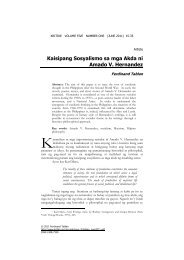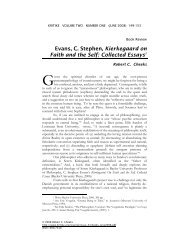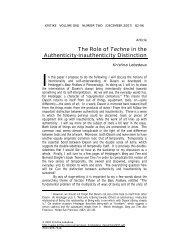Against Alienation: Karol Wojtyla's Theory of Participation
Against Alienation: Karol Wojtyla's Theory of Participation
Against Alienation: Karol Wojtyla's Theory of Participation
You also want an ePaper? Increase the reach of your titles
YUMPU automatically turns print PDFs into web optimized ePapers that Google loves.
82 AGAINST ALIENATION<br />
participate, contribute to the promotion <strong>of</strong> the common good. He takes it as<br />
his task to ensure that he does his part in the achievement <strong>of</strong> the common<br />
good.<br />
The inauthentic attitudes <strong>of</strong> participation are conformism and noninvolvement.<br />
Conformism denotes a tendency to comply with the accepted<br />
custom and to resemble others, a tendency that is in itself neutral, in many<br />
respects positive and constructive or even creative. 36 While conformism may<br />
contribute to the achievement <strong>of</strong> the common good, the main problem in<br />
conformism is the fact that persons do not really appreciate the value <strong>of</strong> their<br />
work. In an ordinary way <strong>of</strong> putting it, they are just “going with the flow.”<br />
People may be conforming to an idea which does not really agree with the<br />
common good. There are various reasons why people conform but all <strong>of</strong> them<br />
point to the fact that there is really no unity but only uniformity. People adapt<br />
themselves to the demands <strong>of</strong> the community in a superficial way for purposes<br />
<strong>of</strong> gaining some immediate advantages or avoiding opposition. Thus, the<br />
conformist is one who submits himself to pressures <strong>of</strong> others and, at the same<br />
time, withdraws from the community. 37 The other inauthentic attitude <strong>of</strong><br />
participation is non-involvement or avoidance. It is characterized by a<br />
disregard for those appearances <strong>of</strong> concern for the common good which also<br />
characterizes conformism. It is nothing but a withdrawal but it lacks the active<br />
concern <strong>of</strong> participation; moreoever, it characterizes man’s absence from the<br />
community. 38 Noninvolvement is also characterized by indifference to the<br />
common good. It is a substitute to the authentic attitudes because they do not<br />
find value in both solidarity and opposition. Noninvolvement is a way by<br />
which a person abstains from participating in the community. On the surface,<br />
it does appear to be a sign <strong>of</strong> protest but, it is just an escape <strong>of</strong> the person from<br />
his role in the community. This inauthentic attitude is characterized mainly by<br />
a disinterested attitude or a sign <strong>of</strong> distrust to the community. Both<br />
inauthentic attitudes are characterized by the absence <strong>of</strong> the person’s active<br />
participation in the community. The difference lies in the person’s convictions,<br />
motives and reasons for performing such activities. Both inauthentic attitudes<br />
deny him <strong>of</strong> his capability to participate in the achievement and the benefits <strong>of</strong><br />
the common good. The inauthentic attitudes <strong>of</strong> participation stand in the way<br />
in the formation <strong>of</strong> an interpersonal community. What results is a very<br />
fragmented society and people become apathetic and disinterested in matters<br />
other than their own.<br />
<strong>Participation</strong> leads to the establishment <strong>of</strong> harmony between persons.<br />
A community <strong>of</strong> persons participating in the pursuit <strong>of</strong> the common good<br />
contributes to the growth and development <strong>of</strong> persons. A community built on<br />
the conscious participation <strong>of</strong> persons for the common good is a community<br />
that brings persons closer to their fulfillment. <strong>Participation</strong> allows every<br />
person to experience one another as a neighbor and a member <strong>of</strong> the<br />
36 Wojtyla, The Acting Person, 289.<br />
37 Francisco, op cit., 71.<br />
38 Wojtyla, The Acting Person, 290.

















